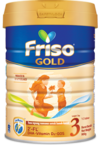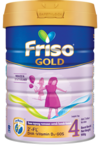Recognising the Signs and Causes of Indigestion in Children
Indigestion happens to the best of us, and even more so to sensitive y.... read more

As parents, our primary concern is our child's well-being. We recognise that nurturing them encompasses more than just instilling values, adhering to feeding schedules, and ensuring their safety. It extends to providing the best possible nutrition to them. The truth is, not all formula milk/susu are created equal, and choosing the right one is vital as your child grows and develops. To support their growth and healthy weight gain, it's essential to understand which powdered formula milk is the most suitable for your child's specific age and developmental stage. Read on to learn more information about how formula feeding should change with age and which formula powdered milk/susu is the right choice to promote healthy weight gain and help your child grow healthy and strong.
Recognising the significance of changing formula milk as your child grows into a toddler cannot be overstated. A child between the ages of 1 to 3 years old will have different nutritional requirements compared to children aged 4 years old and above, hence the formula milk they consume needs to align with these changing nutritional requirements.
As your child grows into a toddler, they will begin adjusting their diets to eat more solids as well. This shift marks an important developmental milestone, and parents should encourage the gradual transition to solid meals while continuing to meet their child's nutritional needs by supplementing their meals with a trustworthy powdered milk formula that has all the essential vitamins and minerals required for growth and healthy weight gain. During this transition period, there are several important factors to consider such as:
● Providing a balanced diet
Depending on your child's age, it's crucial to provide a balanced diet that includes all the necessary food groups. This ensures they receive the nutrients they need for healthy growth and development. A well-balanced diet for children should include fruits and vegetables, grains, protein2, dairy and healthy fats, as well as plenty of water for hydration.
● Switching milk formula
If you’re changing from a different formula milk to Friso® Gold formula milk, it's advisable to do so gradually to minimise digestive issues3. We have provided an illustrated chart below that may help during this period to provide clarity and guidance during this process.
For more tips and insights, check out our helpful article on different milk formula types to understand which type of milk formula is good for your child, and how to transition from other milk formulas to Friso® Gold milk formula.
● Serving recommendations
A general guideline is to offer 2-3 servings of formula milk daily for children between 1 to 2 years old. However, individual needs may vary, so it's essential to monitor your child's response and appetite rather than stick rigidly to what feeding charts tell you. Children often demonstrate their preferences and appetite, and by respecting these cues you can contribute to a positive feeding experience.
● Age-appropriate formula milk
Not all formula milks are suitable for children of every age. Some formula milks have a higher percentage of certain vitamins and minerals required for different ages and developmental requirements. That is why Friso® Gold is dedicated to providing the nutrition your child needs with formula milk specially formulated for different age ranges.
Let's have a conversation on the origins of formula powdered milk/susu. The manufacturing process which formula milk goes through is a vital part of producing high-quality milk. 100% packed and produced in Holland, Friso® Gold is available in over 25 countries, including Malaysia. Our formula milk/susu was specially created using cow's milk to deliver natural nutrition where both science and nature work together at every step; starting from our farms all the way until our products reach store shelves.
A key aspect of our formula milk/susu — LocNutri™ Technology where mild heat is used during the formula production to help preserve the milk protein so it remains as close as possible to its natural structure. Foods are often processed with high heat and as a result, the natural structure of proteins gets damaged or destroyed, which makes it more difficult to be absorbed by the intestines and may lead to indigestion, colic, constipation, and stomach discomfort. Since LocNutri™ Technology only uses mild heat, the proteins are preserved closer to their native structures, so they can be easily absorbed to be used in muscle, skin, and hair production.
A healthy digestive system makes your child less stressed and helps prevent infections, giving them more energy and spirit to have the best experiences with you. Our LocNutri™ Technology preserves nutrients in their native structure, so your child gets the quality natural nutrition they need to explore and grow strong.
Our Friso® Gold 3 growing up formula milk/susu is packed with essential nutrients such as Vitamin D, Vitamin B6, Vitamin E and C, Taurine, Selenium, GOS, Zinc and DHA5 for the support of your child's overall growth and natural body resistance. A good digestive system is a key to them being stronger inside, which means you can both explore more on the outside together.
As your child develops further, there are so many new things in the world for them to explore. Their appetite increases and changes too! Hence, they need a formula milk/susu that will meet their nutritional demands to maintain a healthy diet as they grow.
Our Friso® Gold 4 formula milk/susu gives them the nourishment they need such as DHA, ARA5,6, omega-3 and omega-6 fatty acids4 and Vitamin D. It's made with high-quality cow's milk that is sourced directly from our own farms in the Netherlands and crafted by our Holland Dairy Science Experts. Additionally, it also contains calcium, protein, iron, copper, vitamin A and K1 to support rapid growth of muscle and bone, as well as healthy vision to prepare the body for study as children of 4 years old begin their preschool education. Calcium helps in the normal growth and development of bones and teeth, while protein is essential for your child’s growth, maintenance and repair for the body2. When copper is combined with iron, it allows the body to build red blood cells as well as maintain healthy bones, blood vessels, nerves, and immune system8. Vitamin A enhances vision and immune functions9. Vitamin K1 helps make other proteins in the body that are important for blood, bone and kidney health and can also be found in dark, leafy green vegetables10.
We hope this article has given you a clearer picture on your child’s formula milk needs as well as answered your questions such as “What age can my child drink cow’s milk”.Join us and see how a natural approach to parenting, and nutrition, can help both you and your child grow! As main caregivers, both mothers and fathers are welcome! Of course, don't forget to check with your doctor, paediatrician, or healthcare consultant before making any changes to your child’s diet or if you have any questions regarding your child’s milk consumption habits. For more product information, you can also call the Friso Care Line at 1800-81-3854 for support, available every Monday to Friday, from 8.30am to 4.30pm.
Try Friso Gold — buy direct at Friso Gold Malaysia
References


